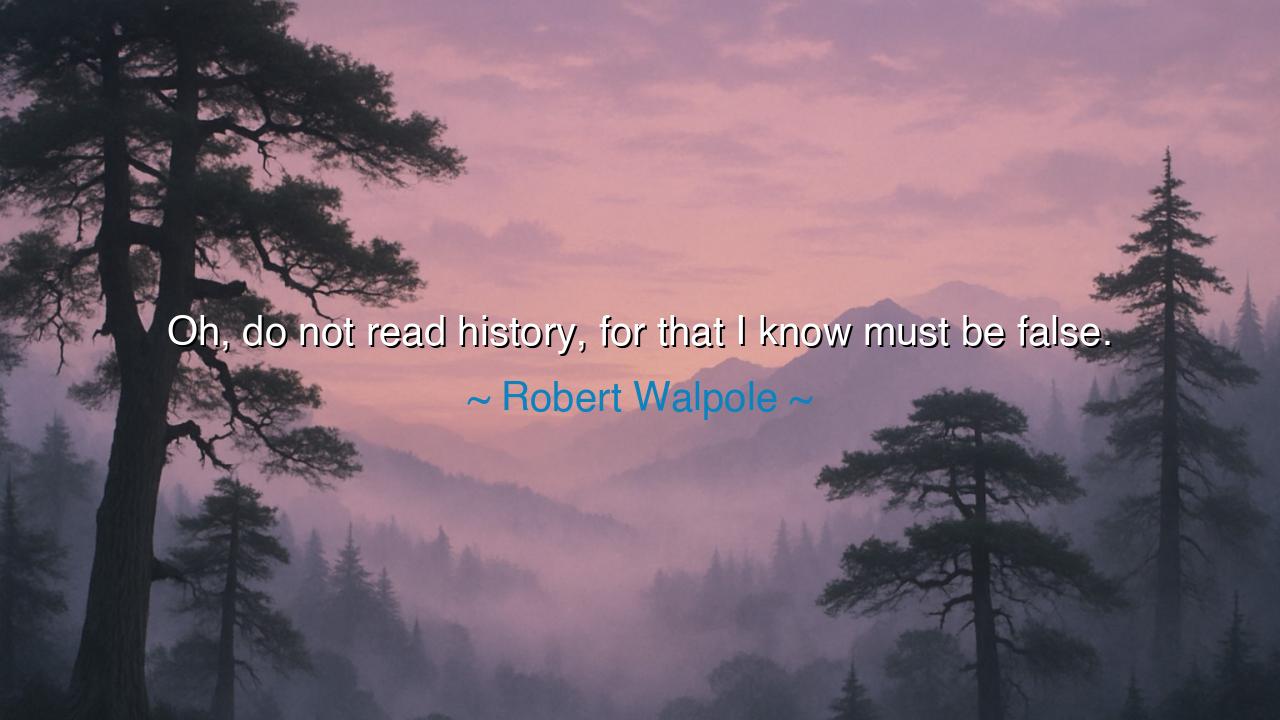
Oh, do not read history, for that I know must be false.






“Oh, do not read history, for that I know must be false.” Thus spoke Robert Walpole, the first de facto Prime Minister of Britain, a man seasoned in politics, power, and the frailties of human ambition. His words were not meant as mere jest, but as a confession drawn from long acquaintance with the deceit that shapes the chronicles of men. For he, who had moved among kings and courtiers, who had seen virtue clothed as vice and vice crowned as triumph, knew that history, as written by victors, is but a mirror dimly reflecting the truth. In that single, almost weary phrase lies a wisdom as old as civilization itself: that the stories of the past are rarely pure, and that truth, though eternal, is often buried beneath the dust of pride, power, and perspective.
To understand this quote, one must first understand the nature of Robert Walpole and the age in which he lived. The eighteenth century was an era of intrigue, when politics was an art of survival, and reputation could be destroyed by a whisper. Walpole, enduring decades at the helm of British governance, became both admired and despised—a statesman to some, a schemer to others. He knew too well how easily records could be twisted, how the same act could be immortalized as noble or damned as treacherous depending on who held the quill. Thus, when he declared that history “must be false,” it was the voice of experience speaking—the lament of one who had seen the truth of his own deeds rewritten by those eager to craft a tale more pleasing to their ambitions.
But beyond Walpole’s personal irony lies a universal truth about the human condition. History is written not by witnesses of eternity, but by men—fallible, passionate, partial. The chronicler selects, the editor erases, the ruler dictates. And so, through the ages, the truth of history becomes an instrument of power. The Pharaohs carved their conquests into stone, but never their failures; emperors erected monuments to their victories, not their cruelties. Even in the modern age, nations dress their past in garments of glory, fearful that honesty might expose their scars. Walpole, in his cynicism, saw that history often serves memory less than it serves mastery—that the written word, once captured by politics, becomes a weapon of illusion.
Yet, there is another way to read his words—a deeper, almost philosophical lament. When Walpole said, “do not read history,” he was not commanding ignorance but warning against blind belief. For he knew that to read without questioning is to become a captive of another’s version of truth. The wise man reads history not as gospel, but as the shadow of truth—to study its contradictions, to seek the voice that trembles beneath the noise of propaganda. The ancients understood this well: Thucydides, in his account of the Peloponnesian War, declared that he wrote not to flatter but to preserve truth “for all time.” And yet, even his truth was shaped by his place within it. Every historian stands at the intersection of fact and perception, and every reader must walk that path with discernment.
Consider, for instance, the tale of Joan of Arc—the shepherd girl who led armies and died by fire. In her own time, the records of her trial branded her a heretic, a witch, a traitor. Two decades later, those same institutions declared her innocent. Five centuries later, she was made a saint. Which history, then, is true? Walpole’s wisdom whispers here: that truth in history is not fixed, but fluid, rising and falling with the tides of human conscience. Each generation rewrites the past to fit its understanding of the present. The story of Joan of Arc reminds us that history is not the voice of the dead—it is the voice of the living, interpreting the dead.
And yet, though Walpole doubted history, he did not doubt the pursuit of truth. His cynicism carries not despair, but challenge. He calls upon us to read with eyes unclouded, to look beyond the words and seek the motives that shaped them. For while history may deceive, it also reveals—if not the absolute truth, then the truths of those who wrote it. In this way, the reader becomes not a passive recipient but an active seeker, discerning the difference between what is told and what is true. The falsehood Walpole warns of is not the end of wisdom, but its beginning.
So let the listener take this lesson to heart: do not reject history, but interrogate it. Do not worship the written page, but weigh it in the balance of reason and morality. Learn not merely what happened, but who wanted you to know it that way—and why. Seek the silenced voices, the forgotten names, the untold sorrows, for there, perhaps, lies the nearest echo of truth.
For in the end, Walpole’s lament is the mark of a man who had seen both greatness and deceit, and who knew that truth, though it may be distorted in ink, cannot be destroyed in spirit. History may lie—but conscience remembers. And so the true reader, armed with discernment and humility, may yet glimpse the light of honesty through the cracks of time’s illusions, and learn to honor not the legends of men, but the lessons of truth.






AAdministratorAdministrator
Welcome, honored guests. Please leave a comment, we will respond soon